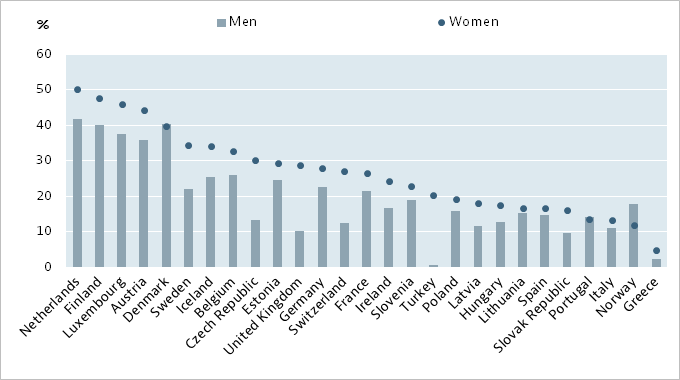Are women entrepreneurs more likely to work out of the home?
March 2019 - Self-employed women are consistently more likely than self-employed men to work out of their home (see Figure). The only exceptions are Norway, Denmark and Portugal. The gap is particularly striking in Turkey, the United Kingdom and the Czech Republic, where the proportions self-employed women working from home are more than double those of men.
Running a business out of the home is a deliberate choice for most home-based business owners. Motivations typically include cost-minimisation, convenience, and/or the nature of the business not requiring commercial premises. For women, childcare is an often-reported reason for running a business from home.
Policy makers can support home-based businesses by removing regulatory barriers (e.g. zoning restrictions), improving digital connectivity in residential and rural areas and improving access to the business support infrastructure. Many local governments are supporting home-based business with the provision of business advisory services and co-working spaces. Some initiatives such as the Somerford ARC Jelly in the United Kingdom are heavily used by women home-based entrepreneurs because workshops and events are organised around school hours and occasionally offer childcare so that the entrepreneurs can participate.
|
Figure 1. Proportion of the self-employed (15-64 years old) who usually work from home, 2017
|
|
Note: ‘Usually’ is defined as working at home for at least half of the days. Home-based businesses where the owner works partly outside of their home (e.g. farmers or consultants) or who use space adjacent to their home with a separate entrance for their business (e.g. a doctor's surgery Source: Eurostat (2018), Labour Force Survey, [lfsa_ehomp] |
Further Reading
- Reuschke, D. and M. Domecka (2018), “Policy Brief on Home-Based Businesses”, OECD SME and Entrepreneurship Papers, No. 11, OECD Publishing, Paris. http://dx.doi.org/10.1787/abfe755f-en
- Halabisky, D. (2018), "Policy Brief on Women’s Entrepreneurship", OECD SME and Entrepreneurship Papers, No. 8, OECD Publishing, Paris, https://doi.org/10.1787/dd2d79e7-en
More data on the OECD Gender Data Portal
Related Documents


